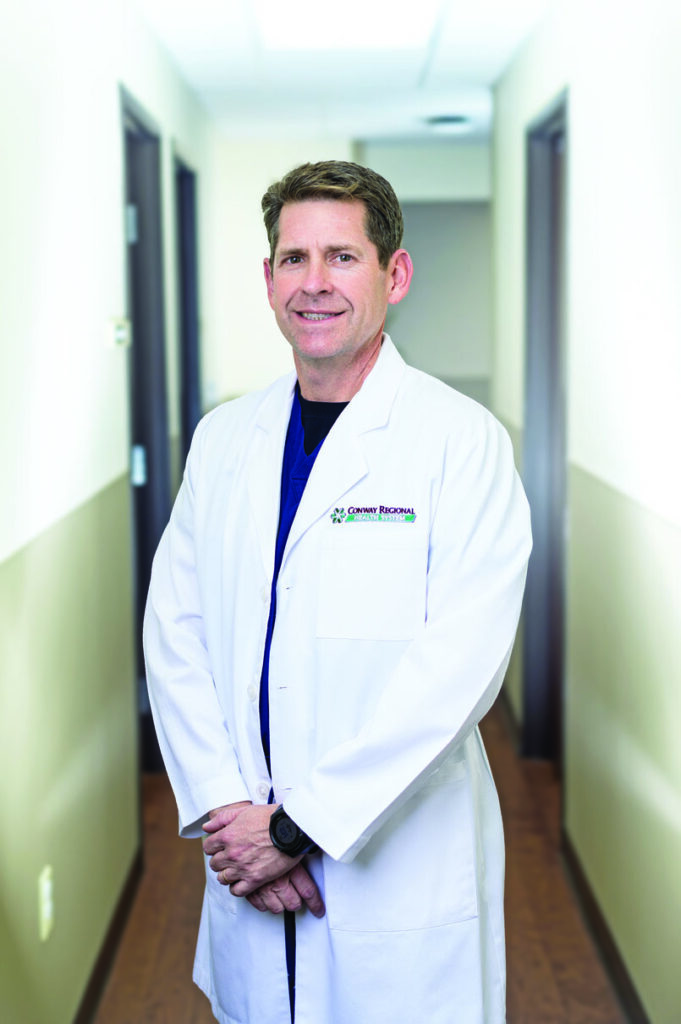28 Feb 2022 Conway Regional GI doctor advocates life-saving colorectal screenings
By John Patton
Colorectal cancer is the second leading cause of cancer mortality in the country and yet it is among the most preventable.
“People don’t understand how common it is, how potentially deadly it can be, and how preventable it is,” said Martin Moix, MD. A gastroenterologist at the Conway Regional Gastroenterology Center, Moix is a passionate advocate for preventive colorectal colonoscopy because of the lives it can save. He has been practicing medicine for more than 20 years.

“A colonoscopy isn’t viewed as a pleasant experience, but it is something that everyone should do. It’s a tragedy when someone over the age of 50 gets colon cancer, because it could have been easily prevented,” Moix said. “The screening is very effective.”
He added, “I don’t like to use the word screening because it is less likely to find cancer in a person without symptoms. I prefer to use the words “preventative colonoscopy.” Using high resolution video scopes, he can detect polyps as small as several millimeters during a colonoscopy. If found, the polyps are removed and later tested for cancer.
“Polyps are a precursor to cancer, so, no polyps, no cancer,” said Moix “By getting people in at age 45, finding the polyps and removing them, we can prevent them from progressing to cancer sometime in the future. We also identify patients who are at risk for potentially developing more polyps.”
He added, “Even if someone is at high risk for colon cancer, as long as you can stay in front of the polyp to colon cancer transformation, you can theoretically prevent them from getting the disease.”
Guidelines
Current guidelines from the American Cancer Association (ACA) have changed, lowering the age for colorectal screening to 45 for everyone, regardless of gender. Individuals with a family history should begin screening at age 40 or ten years earlier than the age their affected family member developed colorectal cancer.
According to the National Cancer Institute’s Surveillance, Epidemiology, and End Results (SEER) program, a study of colorectal cancer data revealed national incidents of colorectal cancer in both men and women under the age of 50 increased two percent between 1995 and 2016. These findings led the ACA to lower the screening age. “There was a subset of people who were not getting routine screenings and they developed cancer,” Moix said. The SEER program is the authoritative source for cancer statistics in the United States.
If a screening is negative and the person has no family history of the disease, the next colonoscopy can wait until they are 55. If polyps are removed, the person needs to be screened sooner, depending on the number and type of polyps.
Moix has benefited from upgrades in video technology since he was in residency at UAMS.
“The optics and electronics are better. When we were doing this in school, we were using a 13-inch screen, and now we’ve got an 80-inch screen and the image is in high definition. We have the ability to detect polyps down to a few millimeters in size.”
Symptoms of Colon Cancer:
In most instances, people with pre-cancerous polyps do not have symptoms until cancers develop. The most prominent symptoms of colorectal cancer are:
• Persistent bleeding
• Changes in bowel habits
• Unexplained weight loss
• Iron deficiency
• Positive fecal screening
Moix implores, “Come in and get screened before it gets to that point.”
Diet and Exercise
A healthier lifestyle is helpful in preventing colorectal cancer.
“Polyps and colon cancer are not purely genetic and, unfortunately, we live in an unhealthy region of the country,” Moix said. “If I look at the percentage of patients who have polyps nationwide, that number is tremendously higher in my practice.” Nationwide about 30 percent of men and 20 percent of women develop pre-cancerous polyps but that number is on the rise in the South. “I would say the number has doubled, maybe tripled, the national average in my practice and I attribute that to the same variables that lead people to get cardiovascular disease, diabetes, and other types of cancer,” he said.
Those risk factors are obesity, poor eating habits (not eating enough fiber, fruits, and vegetables), consuming high fat foods (such as smoked meats and fried foods), inactivity, and smoking. “I have found in my practice that smokers tend to have many more polyps,” he said.
Colon cancer is also hereditary. “I have diagnosed colon cancer in a guy who was running marathons,” said Moix, “but it’s a lot less common to have healthy people develop polyps. As a general rule, people who eat right and exercise are going to have a lower rate of colon polyps and cancer.”
He added, “Colon cancer screening is probably the part of my practice where I can make the biggest difference in someones life because I can prevent them from getting a horrible disease and that’s a good feeling. After all, we’re here to save people’s lives.”











